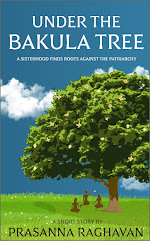Book Review--The Winnowing Waves
The Blurb:
The sea sang lullabies to them at night in the small coastal town of Malabar, where memories of men in boats carrying merchandise from Arab lands had been permanently inscribed into the sands and infused into the blood of their ancestors. The briny breeze sang to them during the day in a dialect of their own.
The winnowing waves tossed the lives of Fouziya, Aminu, and Nabisa, here and there, sometimes on the swirl of a rising, sometimes at the cusp. sometimes at the mercy of the receding sands.
Far from those shores, in a village in the North, where the loo winds doused their dreams with dust and the mustard fields stretched as yellow quilts in the Winter, Anita and Pyaari knit their own tales through the seasons.
And decided that their paths should cross.
The story is a mesh of various arcs, all tied up at the end, beautifully. Fouziya, Aminu, and Nabisa are members of the waning Muslim matriarchal joint family system along the Malabar coast of Kerala at different age levels, prioritising in their conversation matters on top of the everyday life, religion, politics, and belief systems.
The winnowing waves tossed the lives of Fouziya, Aminu, and Nabisa, here and there, sometimes on the swirl of a rising, sometimes at the cusp. sometimes at the mercy of the receding sands.
Far from those shores, in a village in the North, where the loo winds doused their dreams with dust and the mustard fields stretched as yellow quilts in the Winter, Anita and Pyaari knit their own tales through the seasons.
And decided that their paths should cross.
My Review:
The story is a mesh of various arcs, all tied up at the end, beautifully. Fouziya, Aminu, and Nabisa are members of the waning Muslim matriarchal joint family system along the Malabar coast of Kerala at different age levels, prioritising in their conversation matters on top of the everyday life, religion, politics, and belief systems.
The three women develop a joint front of negation against the religious restrictions that bind and limit them seeking paths of knowledge. How has a social life of inclusivity for shared peace and goodness turned to one of the mutual exclusions aimed at separate power build-ups? They discuss them and convey each other through letters.
The author's eruditeness softly manages the transformation from a Sufi culture of Islam into something of the present, leaning towards the Wahabi culture on the one side and matching it against a similar shift in the Hindu fold.
Along the lines, she takes the role of a social activist trying to spread the message on the anxiety and enthusiasm at the communal drift in the name of religion substantiating from a knowledge point.
When she takes the readers from the Malabar coast and the lullabies of the briny waves of the South to the Northern land of winter and the stretches of the yellow mustard fields, they meet Anitha and Pyaari. Two women having lives factored with struggles emanating from others utter disregard for rational judgement in the relationship. They, too, are rational fighters and find meaning in life.
Her characters are believable, realistic, a genuine mix of conservative and liberal males and females.
Style of Writing
The writing style is descriptive, methodical, and appealing.
Excerpts:
"The list of differentials was endless. The metaphysical ethos and the puritanic outlook that had been engendered by the old Sufi order that was meshed in so beautifully into the multi-religious gridwork of the society they had been living in was being replaced by what was being claimed to be a more puritanical, and authentic version of Islam.
....
On the other side, it was all about regaining the honour of the majority. The accepting nature of their religion, that embraced everything within its fold had been the very reason for it being compromised, they said. The narrative was emphasised through many take-offs from the pages of history and a conclusion reached that its very existence was in great peril.
About the author: Nadira Cotti Collan
Born and brought up in the coastal town of Kannur in the Malabar region of Kerala, Nadira migrated to Delhi after her marriage in 1978, where she worked in the Ministry of Railways for twenty-five years before retiring voluntarily in the year 2006. One of the founding members of the Saksham Charitable Trust, an informal school in Nithari, Noida, for the immigrant children, since 2003, she now lives in Bangalore in the role of a grandmother.
My rating for the book 5/5
Format: Kindle eBook.
No of Pages: 364
Published Date: 364
Available on Amazon.com








0 comments
Post a Comment